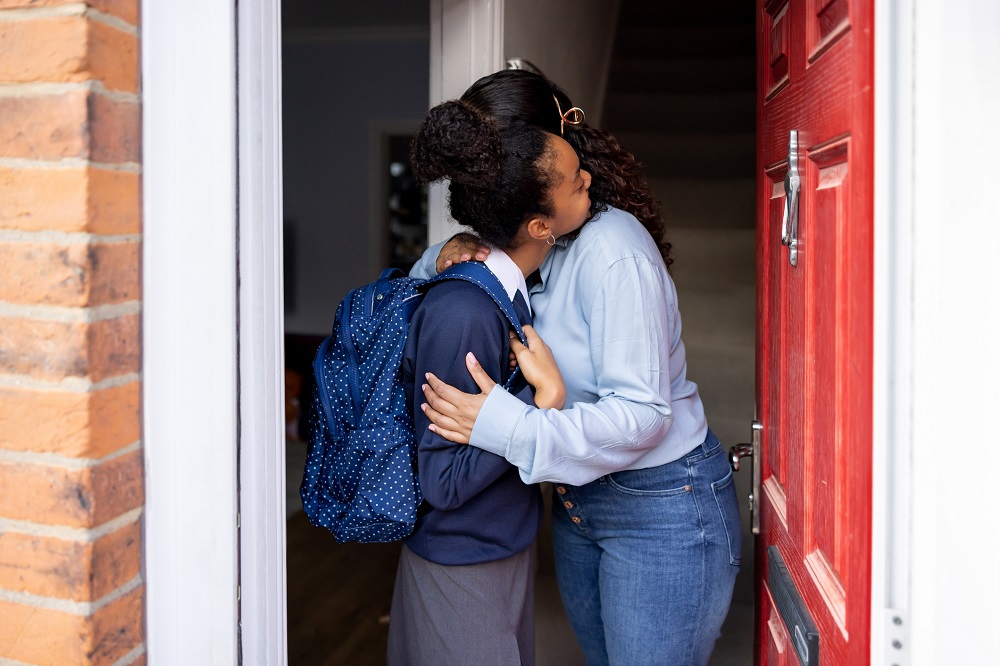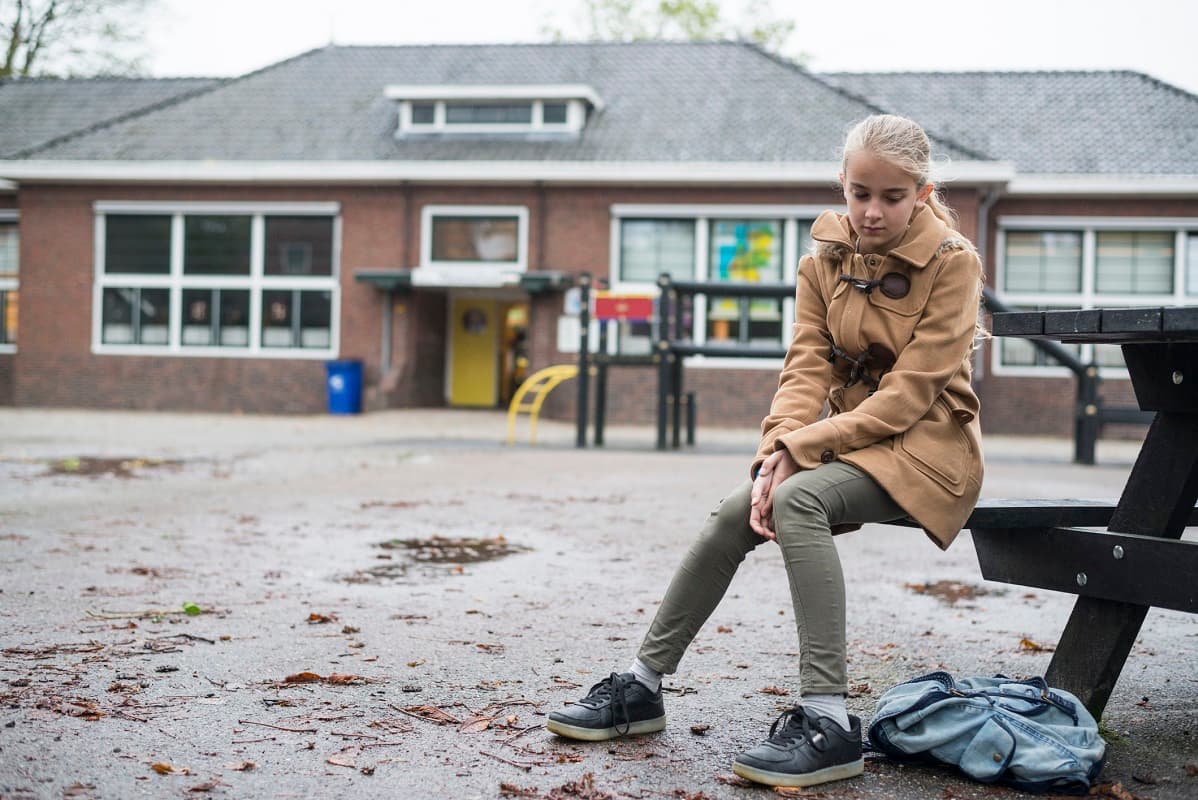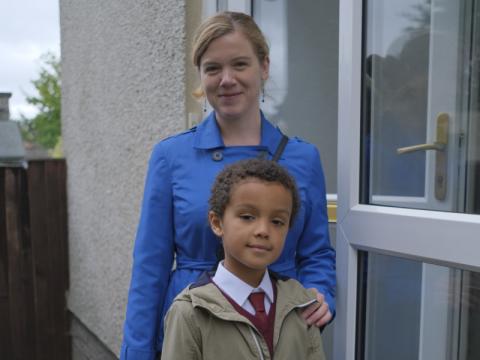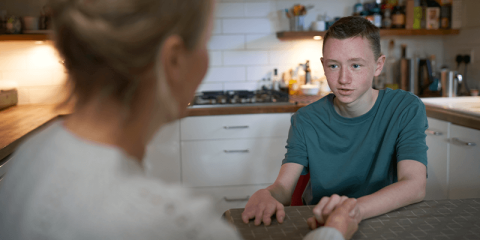The school holidays can seem very long to children and young people (and often to their parents too!) and sometimes the thought of going back to school in August can seem a bit daunting. Here are some tips for helping calm any worries your child may have about going back to school.
Tips for helping calm back to school nerves
Tip #1: Keep talking
It sounds obvious, but make sure your child knows they can come to you with any worries. It may help to have a time set aside during the day when they spend some one-on-one time with you and know they’ll be able to chat.
It can help if you’re doing something else at the same time, like heading out to the shops, walking the dog or cooking a meal, as sometimes it can be easier to talk about awkward things when you don’t have to make eye contact.
Our page on talking and listening to your teen has more advice on helping young people to open up.
Tip #2: Help them build their resilience
Resilience is our ability to cope with setbacks. The more resilient your child is, the more they’ll be able to cope with the ups and downs of school life. Our page on helping your teen build resilience has lots of tips to help with this.
Tip #: Take time to listen and help them find solutions
Even if you’re really busy (for a change!) try to take the time to listen to their concerns. Do your best not to jump in and say things like ‘don’t worry, it’ll all be fine’ as this might seem a bit dismissive. Instead, try problem solving together. For example, you could ask them: ‘What do you think will make you feel better about this?’ and discuss ideas between you.
Tip #4: Don't pass your worries on to them
When you’re chatting to your child, don’t accidentally put your worries onto them. For example, don’t ask them questions like ‘Do you think you’ll get lots of homework?’ or ‘Are you nervous about meeting your new teachers?’ Instead, try to stay positive when you’re talking about school.
Tip #5: Encourage them to see their friends
If your child hasn’t seen much of their school friends over the holidays it may help them feel less nervous if they spend some time with them before going back to school. So encourage them to meet up with some friends ‘in real life’ and maybe arrange to walk to school together when term starts.
Tip #6: Encourage them to think about the good things about school
Suggest they make a list of the things they’re looking forward to when they go back, like seeing friends again, studying a new subject, joining a new club or starting a new activity. They could stick this list up on their mirror or on the fridge, to remind them that it’s not all bad!
Tip #7: Help them get into a good sleep pattern

Teenagers’ body clocks are naturally set to staying up late and having a long lie-in. They’re not being lazy if they find it hard to get up in the mornings, it’s just the way their bodies work at this age. So during the holidays it’s likely that bedtimes and getting up times will have slid later and later.
Try to ease them gently into the new term by encouraging them to gradually move their bedtime forward. This will help them to sleep better the night before they go back, and to wake up full of energy and ready to face the day, instead of feeling tired and grumpy.
Check out our sleep tips for older children and teens for more advice.
Tip #8: Help them develop some ways to keep calm
There are lots of simple things you can try with your child to help them calm down if they’re feeling anxious – and they can use these at school too if they feel overwhelmed. For example, they could try simple breathing exercises, like breathing in for 5 counts and out for 7, or naming 5 things they can see, 4 things they can touch, 3 things they can hear, 2 things they can smell and one thing they can taste.
YoungMinds have lots more ideas in their self-care guide.
Tip #9: Plan something fun
If your child is feeling worried about their first week back, it can help to plan something nice and relaxing to do over the following weekend so they can look forward to it. This could be something simple like making and eating pizza together (we have lots of recipes here), having a film night or playing some computer games together.
Tip #10: Remind them that their worries are perfectly normal
Lots of people worry about changes in their lives, and worrying about going back to school is perfectly normal! Chances are most of their friends are feeling exactly the same.
If your child seems very anxious
It’s perfectly natural for kids to feel a bit worried or anxious about going back to school after the holidays. But how you can tell the difference between normal nervousness and more serious symptoms of stress or anxiety? Here are some signs to look out for:
- they seem moody, emotional or teary, or easily upset
- they talk about themselves in a negative way, for example, saying that they’re stupid or a failure
- they can’t focus on their work
- they’re irritable or short-tempered
- they have physical symptoms, like feeling sick, shaky, sweaty, breathless or dizzy, or getting break-outs of spots and other skin conditions
- they aren’t sleeping well
- their appetite or eating habits change.
If you spot any of these signs, it’s a good idea to have a chat with your child to try to uncover what’s wrong. Our page on talking and listening to your teen has tips to help with this.
If the symptoms don’t go away, you may need to consider getting further support, for example, by talking to the school or your GP. Our pages on teen behaviour – what’s typical and what’s a warning sign? and supporting teens with low mood and depression have more information and advice and you can find organisations offering advice and support here.
 Activities & Play
Activities & Play Behaviour
Behaviour Childcare
Childcare Development & Growing Up
Development & Growing Up Family, Friends & Relationships
Family, Friends & Relationships Feeding Your Baby
Feeding Your Baby Food & Eating
Food & Eating Health & Safety
Health & Safety Mental Health & Wellbeing
Mental Health & Wellbeing Money & Work
Money & Work Online Behaviour & Safety
Online Behaviour & Safety Pregnancy & First Days
Pregnancy & First Days School & Education
School & Education Sleep
Sleep








 Online Behaviour & Safety
Online Behaviour & Safety
 Mental Health & Wellbeing
Mental Health & Wellbeing